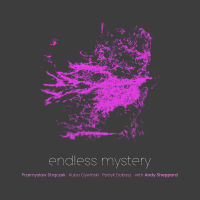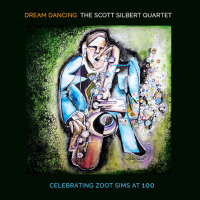Articles by Marithe Van der Aa
Sander Baan Quartet: Heartscape
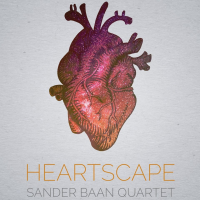
by Marithe Van der Aa
Unpretentious and unassuming--The Sander Baan Quartet's second album, Heartscape, is everything you might expect from a group of well-seasoned musicians with a clear artistic vision. Their music is simple, nonchalant and free from the fetters of the widespread jazz ego.Featuring both compositions of the bandleader, Dutch saxophonist Sander Baan, and the quartet's bassist, Jonathan Nagel, the album opens with “Emotional Landscapes," promptly laying down the band's signature recipe: a solid groove, a dash of effortlessly uncomplicated harmonies and ...
Continue ReadingJazz & The Wolf

by Marithe Van der Aa
When a literary critic is analysing one of Hermann Hesse's most influential novels, the discussion of jazz music used as a literary device might not immediately jump to his mind. However, throughout Steppenwolf, a story about a troubled academic who believes to be split between man and wolf, jazz proves to be a crucial motif. “From a dance hall there met me as I passed by the strains of lively jazz music, hot and raw as the steam ...
Continue ReadingSwinging with Sartre: Jazz Is Like Bananas

by Marithe Van der Aa
“Jazz is like bananas, it must be consumed on the spot." These immortal words were first brought to life by the famous French philosopher Jean-Paul Sartre in an article that appeared in the Saturday Review, November 29, 1947. The article, titled I Discovered Jazz in America, was written after a visit to New York City in the mid-forties, where Sartre had attended a jazz performance at Nick's Bar. “They play. You listen. No one dreams. Chopin ...
Continue ReadingBruno Råberg: Triloka: Music for Strings and Soloists

by Marithe Van der Aa
The number three has always had a symbolic and spiritual significance in many different religions and cultures--and, in his latest album Triloka (literally translated as 'Three Realms'), Swedish bassist Bruno Råberg pays his own personal homage to the trinity of...well, everything. Inspired by South Indian carnatic music, the album immediately cuts to the chase with its enchanting title track, “Triloka," which--not too surprisingly--has a threefold structure. The entire album is written for strings only, and despite not having ...
Continue ReadingMarc Doffey Quintet: Taking Direction
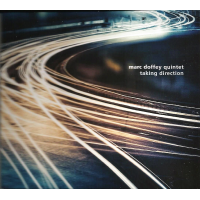
by Marithe Van der Aa
Over the course of 17 tracks, the Berlin based Marc Doffey Quintet sets out to create a suite filled with lyrical and dynamic soundscapes... and succeeds. Their debut album, Taking Direction, consists of compositions written by each individual band member and brief, improvised interludes. By including compositions of each member, the Marc Doffey Quintet places a refreshing emphasis on the diversity and various personalities that determine the group's sound. In the jazz scene--a place where it is dangerously ...
Continue ReadingJazz & Existentialism: Worlds Apart?

by Marithe Van der Aa
Jazz: a form of musical expression that originated in the United States. Existentialism: a European school of thought that reached its peak in the 1940s. At first thought, we might not associate these two phenomena with one another, yet their correlation throughout history is indisputable. Existentialism in the modern sense of the word, was largely defined in France during and after World War II. There are a considerable amount of factors one must take into account when examining ...
Continue ReadingMoon Trio: Moon Trio: Earth-Time
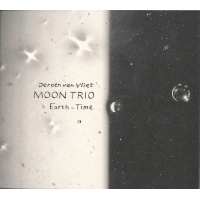
by Marithe Van der Aa
Graceful melodies and grooves merge together effortlessly on the debut album of this recently formed trio led by Dutch pianist Jeroen Van Vliet. With the help of occasional electronic effects, Van Vliet and his trio create soundscapes of a dreamlike quality that trigger and inspire the imagination.While it is far from uncommon for contemporary jazz musicians to resort to technical showmanship, these three musicians wisely refrain--and it becomes them. On Earth-Time you will find no complex melodies , ...
Continue ReadingWhat would Plato have thought about jazz music?

by Marithe Van der Aa
"The safest general characterization of the European philosophical tradition is that it consists of a series of footnotes to Plato." (Alfred North Whitehead, Process and Reality, p. 39 [Free Press, 1979]) Have you ever wondered what one of the most celebrated philosophers of Ancient History might have thought about jazz music if he had lived to witness its development? There are several fragments of Plato's writings that may point us in the direction of finding out.
Continue ReadingGlamour or Gloom? Fitzgerald's Jazz Age

by Marithe Van der Aa
Many names have been given to the 1920s: the Roaring Twenties, the Golden Twenties, Les Années Folles and, of course, the Jazz Age. It was a decade fuelled by innovation and change; a time of movement: cars were becoming the favoured means of transportation, commercial airline flights were on the rise, social dancing was energetic and popular music was “hot." Those who are familiar with the writings of the celebrated author F. Scott Fitzgerald, will know that his work is ...
Continue ReadingAccording To Adorno: A Portrait Of Jazz's Harshest Critic, Part 2

by Marithe Van der Aa
Part 1 | Part 2 Though Adorno had many points of criticism regarding the technical aspects of jazz, his contempt for the music genre was fueled by something else. Given the fact that Adorno was best known for his critical theory of society, it is far from surprising that jazz would not escape a social deciphering in his essays."Jazz is not what it 'is,'" he claims in Über Jazz; jazz is defined by the role it plays in ...
Continue Reading

